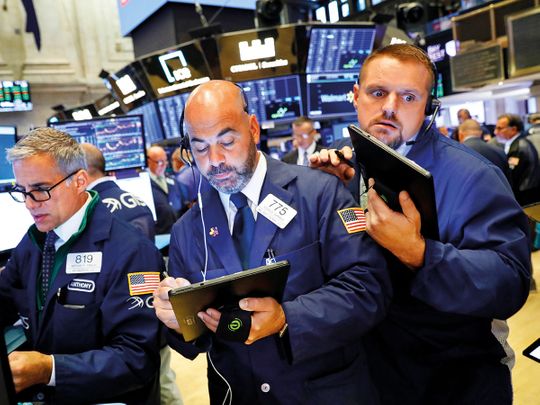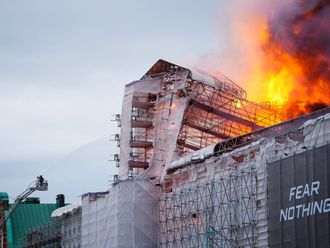
Dubai: Investors will eye more macro uncertainty this holiday-shortened week, with Asian markets bogged by Hong Kong initiating another round of protests against Chinese dominance.
Global stocks dropped Friday after China imposed new rules that sought to extend its control over Hong Kong, allowing it to crack down on dissent in the semi-autonomous region. Hong Kong’s Hang Seng Index closed down 5.7 per cent on Friday, with declines seen in all other major indexes.
Meanwhile, the pace of spread of coronavirus infections worldwide will stay in focus for investors worldwide, even as the US exchanges shut shop on Monday for Memorial Day and a number of bourses elsewhere stay closed though most of this week on account of Eid al-Fitr celebrations .
Another US-China showdown?
War-like rhetoric was dominating global headlines again just as China announced a new controversial plan to tighten its grip on the partly-controlled region of Hong Kong, sparking a new round of protests.
The move risks triggering another round of tit-for-tat escalation between the global superpowers, which have seen ties spiral to their worst in decades since the COVID-19 outbreak turned rampant.
Hong Kong has increasingly become a pawn in deteriorating relations between Washington and Beijing, and observers have been watching for any signs that activists are gearing up for a fresh challenge.
Hong Kong protests to worsen
“The move will probably trigger protests and civil disruption that delays the (Hong Kong) city’s economic recovery from the coronavirus crisis,” cautioned Mark Williams, Chief Asia Economist at Capital Economics, while noting that Hong Kong’s future as a global city is in doubt.
“Further ahead, the erosion of Hong Kong’s autonomy will undermine the foundations of its economic success as an international city within China,” Williams added. “And it is a reminder that the priority of the Party leadership is control, even if it comes with an economic cost.”
Anti-government protests that escalated in June last year plunged the city into its biggest political crisis in decades, battered the economy and posed the gravest popular challenge to President Xi since he came to power in 2012.
Last year’s mass riots to return?
Police in Hong Kong on Sunday fired tear gas against protesters taking part in the first pro-democracy demonstration since China revealed its plans to impose a new security law on the communist-controlled mainland. Hundreds of demonstrators have been marching through the city centre.
Reports say Sunday’s protest followed a similar pattern to many of last year’s demonstrations. (Over 8,300 people have been arrested since pro-democracy protests erupted last year.)
The sometimes violent clashes that roiled the city saw a relative lull in recent months as the government imposed measures to curb the spread of coronavirus.
War-like rhetoric continue
Earlier last week, US Secretary of State Mike Pompeo condemned China’s plans over Hong Kong, which he described as a “death knell” for the city’s freedoms. The UK, Australia and Canada have also expressed their “deep concern”.
The US is currently considering whether to extend Hong Kong’s preferential trading and investment privileges. President Trump has also weighed in, saying the US would react strongly if the law went through - without giving details.
Speaking on Sunday, China’s Foreign Minister Wang Li warned against the recent strain in China-US relations, adding that the two countries were now being pushed to the “brink of a new Cold War”.
More bad econ data to roll in
Some US April manufacturing data in durable goods is due on Thursday and April’s consumer income and spending data will be released on Friday.
While that should provide an interesting view of how sluggish activity became, the market is expected to focus more on May consumer confidence on Tuesday and consumer sentiment on Friday.
Analysts regard the backward looking figures to not get any attention paid to it considering the data is going to be terrible, which isn’t surprising.
COVID vaccine pipeline is key
While eyeing progress of economies reopening amid the threat of another wave of new virus infections, analysts add that investors are likely to hang on every new bit of development on the vaccine front.
A big catalyst came Monday, when US biotech firm Moderna disclosed positive data from a small group of patients in an early trial. On Friday White House health advisor Dr. Anthony Fauci said the data showed promise and he was cautiously optimistic a vaccine would be developed.
Astra Zeneca’s vaccine effort got a boost this week when it received $1 billion from the US Health Department’s Biomedical Advanced Research and Development Authority to develop a coronavirus vaccine from the University of Oxford.












